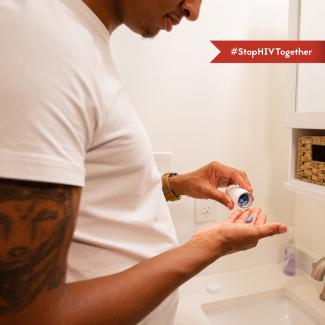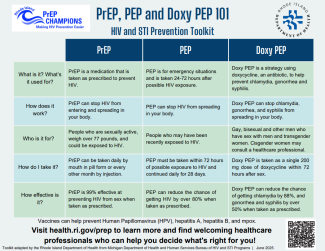Pre-Exposure Prophylaxis (PrEP) and Rhode Island PrEP Champions
PrEP can help you stay free from HIV. It is important to talk to a healthcare professional to determine if PrEP is right for you. PrEP Champions are Rhode Island clinics that specialize in offering sexual health services and make it easy to obtain PrEP, but you can also ask your primary care provider about PrEP.

What is PrEP?
- PrEP (pre-exposure prophylaxis) can be pills or shots that dramatically reduce your chances of getting HIV through sex or injection drug use.
PrEP protects you against HIV but not against other sexually transmitted infections (STIs). Doxy PEP can protect you against sexually transmitted infections. Condoms can protect you from both HIV and STIs. To learn more about all the ways you can prevent HIV and STIs, please see RIDOH's Guide to Safer Sex. RIDOH offers free condoms by mail to any address in Rhode Island.
How to Get PrEP: Rhode Island’s PrEP Champions Network

It’s easier than ever to get PrEP! Rhode Island’s PrEP Champions network lists available PrEP services and has videos of trusted healthcare professionals from sexual health clinics and community health centers in Rhode Island that will help you decide if PrEP is right for you.
Some of these clinics offer low or no cost services and assist in minimizing any out-of-pocket costs associated with your prescription and associated testing. In addition, there are many online telehealth services (such as MISTR) that prescribe PrEP and offer medication by mail and may be available at no or low cost. We encourage you to explore any option that works best to meet your needs!
We will be adding additional videos from other PrEP Champions in the near future.

PrEP Champions: Clinics
- Blackstone Valley Community Health Center
- Pawtucket: 39 East Ave, Pawtucket, RI 02860 and 1145 Main St, Pawtucket, RI 02860
- Central Falls: 1000 Broad St, Central Falls, RI 02863
- Phone number: (401) 722-0081
- Clinic offers same day PrEP.
- PrEP is available for patients under 18.
- Sliding scale is available for co-pays if patients don’t have insurance.
- Block Island Health Services
- New Shoreham: 6 Payne Rd, New Shoreham, RI 02807
- Phone number: (401) 466-2974
- PrEP is available for patients under 18.
- Sliding scale is available for co-pays.
- Care New England Medical Group
- Pawtucket: 111 Brewster Street, Pawtucket, RI 02860
- Phone number: (401) 729-2500
- Clinic offers same day PrEP.
- Sliding scale is available for co-pays.
- Patients need to be receiving other services at the clinic to receive PrEP.
- CharterCare Medical Associates
- Providence: 50 Maude St, 3rd Floor, Providence, RI 02908
- Phone number: (401) 456-2437
- Please contact Sandy Restrepo for appointment information only.
- Clinic offers same day PrEP.
- Offers services to insured patients only.
- Corliss St. Clinic (formerly known as the Miriam STI Clinic)
- Providence: 180 Corliss St, Providence, RI 02904
- Phone number: (401) 793-4715
- Please call the main number and speak with their nurses.
- Clinic offers same day PrEP.
- PrEP is available for patients under 18.
- Financial assistance is offered if needed, on a case-by-base basis.
- East Bay Community Action Program (EBCAP)
- Riverside: 100 Bullocks Point Avenue, Riverside RI, 02915
- Newport: 6 John H Chafee Blvd, Newport RI 02840
- Phone number: 401-848-2160
- Kristine Williamson, Nurse Case Manager, can assist.
- PrEP is available for patients under 18.
- Sliding scale is available for co-pays.
- Patients need to be receiving other services at the clinic to receive PrEP.
- Family Care Center
- Pawtucket: 111 Brewster St, Pawtucket, RI 02860
- Phone number: 401-729-2304
- Clinic offers same day PrEP.
- PrEP is available for patients under 18
- Patient navigators can help with financial assistance.
- Call and ask about PrEP for an expedited appointment. Patients can get PrEP even if they are not a primary care patient at this clinic.
- Hasbro Adolescent Healthcare Center
- Providence: 1 Hoppin Street, Suite 3055, Providence, RI 02903
- Phone number: 401-444-5980
- Clinic offers same day PrEP.
- PrEP is available for patients under 18. Care is available to youth up to the age of 22.
- The Medicine Pediatrics Primary Care Center
- Providence: 245 Chapman Street, #100, Providence RI 02905
- Phone Number: (401) 444-6118
- Clinic offers same day PrEP.
- Clinic offers sliding scales for co-pays.
- PrEP is available for patients under 18.
- PrEP is a service for active patients. Patients need to be seen at the clinic for ongoing primary care.
- Open Door Health
- Providence: 7 Central St, Providence, RI 02907
- Phone number: (401) 648-4700
- Clinic offers same day PrEP.
- PrEP is available for patients under 18 on case-by-case basis.
- Sliding scale is available for co-pays.
- Call and ask about PrEP for an expedited appointment.
- Planned Parenthood of Southern New England
- Providence: 175 Broad St, Providence, RI 02903
- Phone number: (800) 230-7526
- Clinic offers same day PrEP.
- PrEP is available for patients under 18.
- Sliding scale is available for co-pays. PPSNE has a navigator who helps with manufacturer assistance programs.
- Accepts patients with no insurance (financial assistance available).
- Providence Community Health Centers
- Providence: 355 Prairie Avenue, Providence RI 02905 and 31 Atwood Street, Providence RI 02909
- Phone number: (401) 415-9000
- Call the site directly; Diane Kerfoot can assist.
- PrEP is available for patients under 18.
- Sliding scale is available for co-pays. PCHC assists patients in applying for patient assistance through the drug manufacturer, as well as work with local pharmacies to cover costs as needed.
- Thundermist Health Center
- Wakefield/South County: South County, 1 River Street Wakefield, RI 02879
- West Warwick: 186 Providence Street, West Warwick, RI 02893
- Woonsocket: 450 Clinton Street, Woonsocket, RI 02895
- Phone number: (401) 235-6898 (all locations)
- Clinic offers same day PrEP.
- Sliding scale is available for co-pays.
- Tri-County Community Action
- Johnston: 1126 Hartford Ave, Johnston, RI 02919
- North Providence: 33 Maple Ave, North Providence, RI 02911
- Phone number: (401) 519-1940
- Clinic offers same day PrEP.
- Sliding scale is available for co-pays.
- Veterans Affairs Medical Center
- Providence: 830 Chalkstone Ave, Providence, RI 02908
- Phone number: (401) 273-7100 Ext 12251
- You can also call Jennifer Hopgood (401) 273-7100 Ext 15040
- Clinic offers same day PrEP.
- Sliding scale is available for co-pays. PrEP is covered for all veterans nationally under their existing health benefits.
- Services are available for enrolled veterans.
- Wood River Health
- Hope Valley: 823 Main St, Hope Valley, RI 02832
- Westerly: 11 Wells St, Westerly, RI 02891
- Phone number: (401) 539-2461
- Clinic offers same day PrEP.
- PrEP is available for patients under 18.
- Sliding scale is available for co-pays. Other patient assistance programs are available.
What to Know about Injectable PrEP
Two long-acting injectable forms of PrEP (shots) have been approved by the Food and Drug Administration (FDA):
- Apretude® (cabotegravir) is for adults and adolescents at risk for HIV through sex who weigh at least 77 pounds. It’s an injection given by a health care professional every other month instead of daily oral pills.
- Yeztugo® (lenacapavir) is for adults and adolescents at risk of HIV through sex who weigh at least 77 pounds. It is an injection given by a health care professional twice yearly instead of daily pills. The starter dose includes oral pills taken for the first two days to get the medication concentration in the body up to protective levels quickly.
Please check with your health insurer and/or discuss any potential questions or concerns about costs and patient assistance programs with one of our PrEP Champions.
Please note: A list of additional clinics offering sexual health services in Rhode Island, as well as information about healthcare rights and privacy in Rhode Island may be found on the RIght To Know web app. RIDOH does not endorse any healthcare clinics or healthcare professionals, but is providing this information as a resource.
If you are currently a student at a Rhode Island college/university, reach out to your Student Health Services. If you have additional questions about finding PrEP on your campus, please reach out to RIDOH at (401) 222-2577.
If you are a clinician interested in joining the PrEP Champions Network, please reach out to RIDOH’s HIV Prevention Manager.
Learn more about HIV PrEP, Doxy PEP to prevent STIs, and other HIV and STI prevention options in this article from Kristen Foskett, DNP, FNP, a Rhode Island PrEP Champion and nurse practitioner at Corliss Clinic.
Is PrEP right for you?
PrEP is a medicine that, when taken as prescribed, dramatically reduces your chances of getting HIV from sex or injection drug use. For more information, please see the "Let's Talk About PrEP" video.
Visit a Healthcare Professional
- To find out if PrEP is right for you.
- As recommended for follow-up visits, HIV tests, and prescription refills or PrEP injections (shots).
- If you have any side effects while taking PrEP that become severe or don’t go away.
- If you don’t have a provider, see the information above or visit preplocator.org.
How do I pay for PrEP?
We know that cost is a concern for many people seeking PrEP. There is good news that many health insurance plans fully cover its cost and many healthcare professionals provide patient financial assistance programs, as well as sliding fee scales (paying what you can based on your income) for those without health insurance. Check with your healthcare professionals and/or health insurance plan at your first appointment.
- Co-pay assistance programs help lower the costs of PrEP medications. Income is not a factor in eligibility.
- ViiVConnect offers a program to help patients pay for injectable PrEP (shots). Learn more at viivconnect.com.
If you don’t have insurance, consider enrolling in an insurance marketplace, PrEP assistance program, or your state’s Medicaid plan, if you are eligible.
Learn more about PrEP insurance coverage and payment assistance coverage
Frequently Asked Questions (FAQs) about PrEP
PrEP is short for “Pre-Exposure Prophylaxis”. In general terms, it means a medication a person takes to prevent getting a disease or infection.
PrEP is a medication prescribed by a doctor that you can take to prevent getting HIV. HIV is most commonly spread through sexual activity and sharing of needles. Generally, PrEP is a pill you swallow once a day, but it can also be given as a shot by your doctor every 1-2 months.
HIV PrEP is for people who are not living with HIV and it prevents HIV infection if a person is exposed to HIV.
HIV PEP (Post Exposure Prophylaxis) refers to a medication for people AFTER they may have been exposed to HIV through sex or blood (i.e., needle). This medication must be taken within 72 hours after exposure, but ideally as soon as possible.
DoxyPEP (which is different from HIV PEP) is a medication (the antibiotic doxycycline) that is prescribed by a doctor that should be taken as soon as possible, or within 72 hours of sex to reduce the chances of infection for bacterial sexually transmitted infections (STIs), such as syphilis, gonorrhea, and chlamydia. Currently, doxyPEP is only recommended for gay, bisexual, and other men who have sex with men (GBMSM), and transgender women who have sex with men.
It’s recommended that sexually active people who engage in sex with multiple partners consider taking HIV PrEP, as well as taking doxyPEP after each sexual encounter. People that do not have HIV and who are in a relationship with someone who is living with HIV should also consider HIV PrEP. Condoms provide additional protection from HIV and STIs. People should discuss different options with their primary care provider. A list of HIV PrEP champions and clinics is also available on this webpage.
Yes, all people who may be at elevated risk of HIV should consider PrEP regardless of sex, gender, or sexual orientation. Individuals may be at elevated risk of HIV if they have a partner who is HIV positive, have multiple sex partners, or inject drugs. People should discuss this with their primary care provider. A list of HIV PrEP champions and clinics is also available on this webpage.
In general, PrEP has very few side-effects. A small percentage of people can experience side-effects from taking PrEP.
Taking PrEP requires periodic doctor visits, lab testing, and the purchase of medication. For people who have health insurance, these services should be covered. For people who do not have insurance, many clinics have patient financial assistance services and sliding fee scales that can drastically reduce the out-of-pocket costs of PrEP.
No, PrEP only protects against HIV and does not protect against other STIs. Protection from other STIs can be achieved through doxyPEP and condom use.
If you have a regular primary care provider, considering reaching out to them to arrange an appointment so that you can confidentially discuss getting PrEP. If you don’t have a provider that you feel comfortable with, check out this webpage to find a list of clinics that have safe and welcoming health services for all people.
If you believe you are at risk for HIV and would benefit from taking PrEP, consider contacting the clinics listed on this webpage to help you get PrEP.
For people who have infrequent sex and prefer not to take PrEP on a daily basis, PrEP on Demand (also known as PrEP 2-1-1 or event driven PrEP) is an alternative to reduce risk of HIV infection. This means taking 2 pills 2-24 hours before sex, 1 pill 24 hours after the first dose, and 1 pill 24 hours after the second dose. This method has only been studied with the use of Truvada in men who have sex with men and in transgender women.
Here is a list of places in Rhode Island to get free condoms. You can also order free condoms by mail.
HIV PrEP is only meant for people who do not have HIV. HIV PrEP medications can be part of a medication regimen to treat HIV, but it is only a partial treatment. If you are living with HIV, you should follow the directions from your doctor regarding taking your HIV medications. Taking your HIV medications correctly will lead to an undetectable viral load. This will minimize risk of HIV transmission to partners.
Yes, approximately 70 to 90 people in Rhode Island are diagnosed with HIV each year. The majority of these people are gay, bisexual, and other men have sex with men. In a 2017 national study, it was estimated that one out of two black gay men, one out of four Hispanic gay men, and one out of eleven white gay men, will acquire HIV in their lifetime.
All people who are sexually active should consider protecting themselves from HIV and other STIs by using HIV PrEP, DoxyPEP, and condoms, as appropriate. In addition, talking to your doctor and getting regularly screened for HIV/STIs is important. If you do have HIV, it is important to take your medication and stay in care. If you get a STI, be sure to take all the medication prescribed by your doctor and let your partners know that they should get tested. Getting certain vaccinations, such as for mpox, HPV, Hepatitis A, and Hepatitis B, can also help you stay healthy.
Yes, check out this site that has additional helpful information and FAQs.
